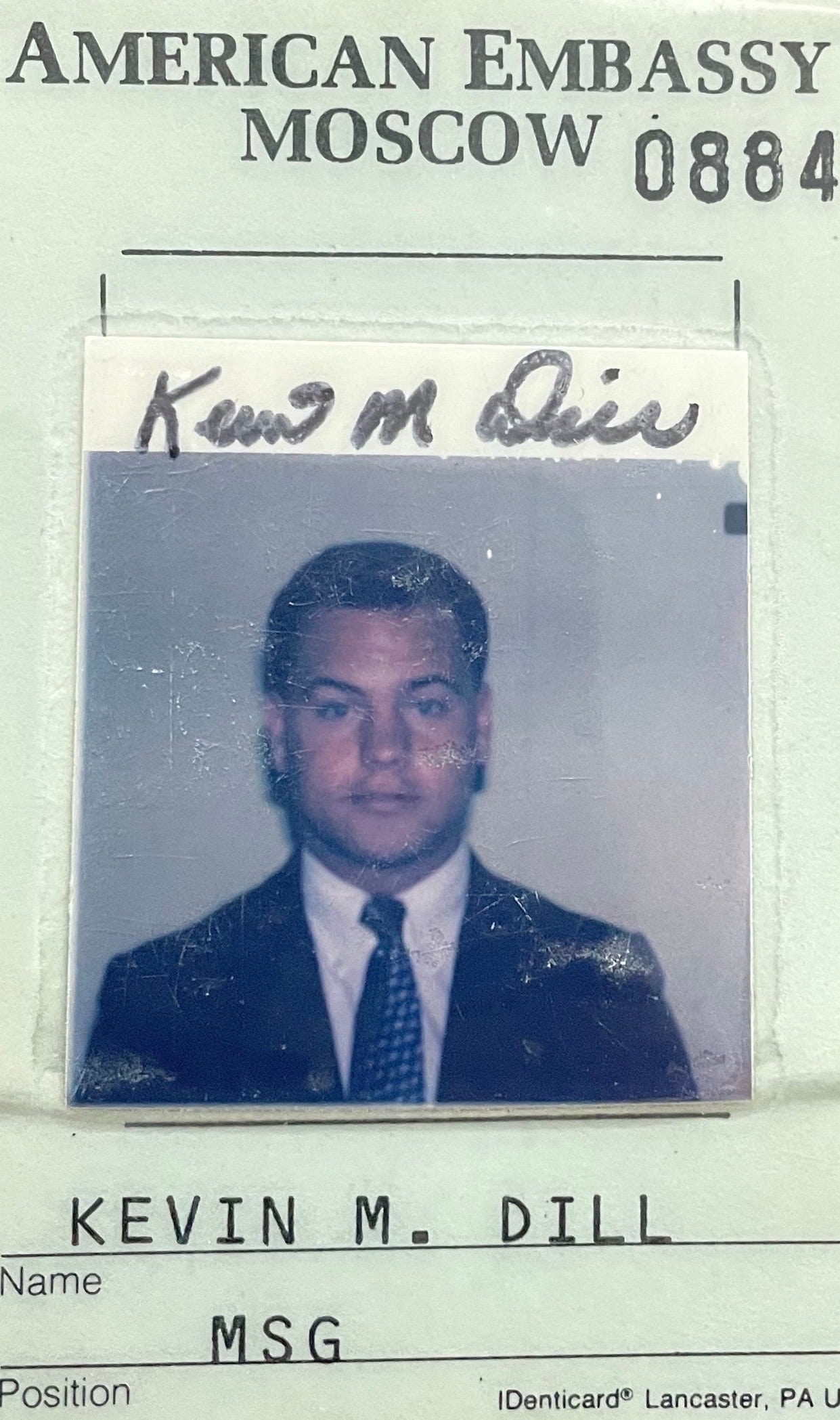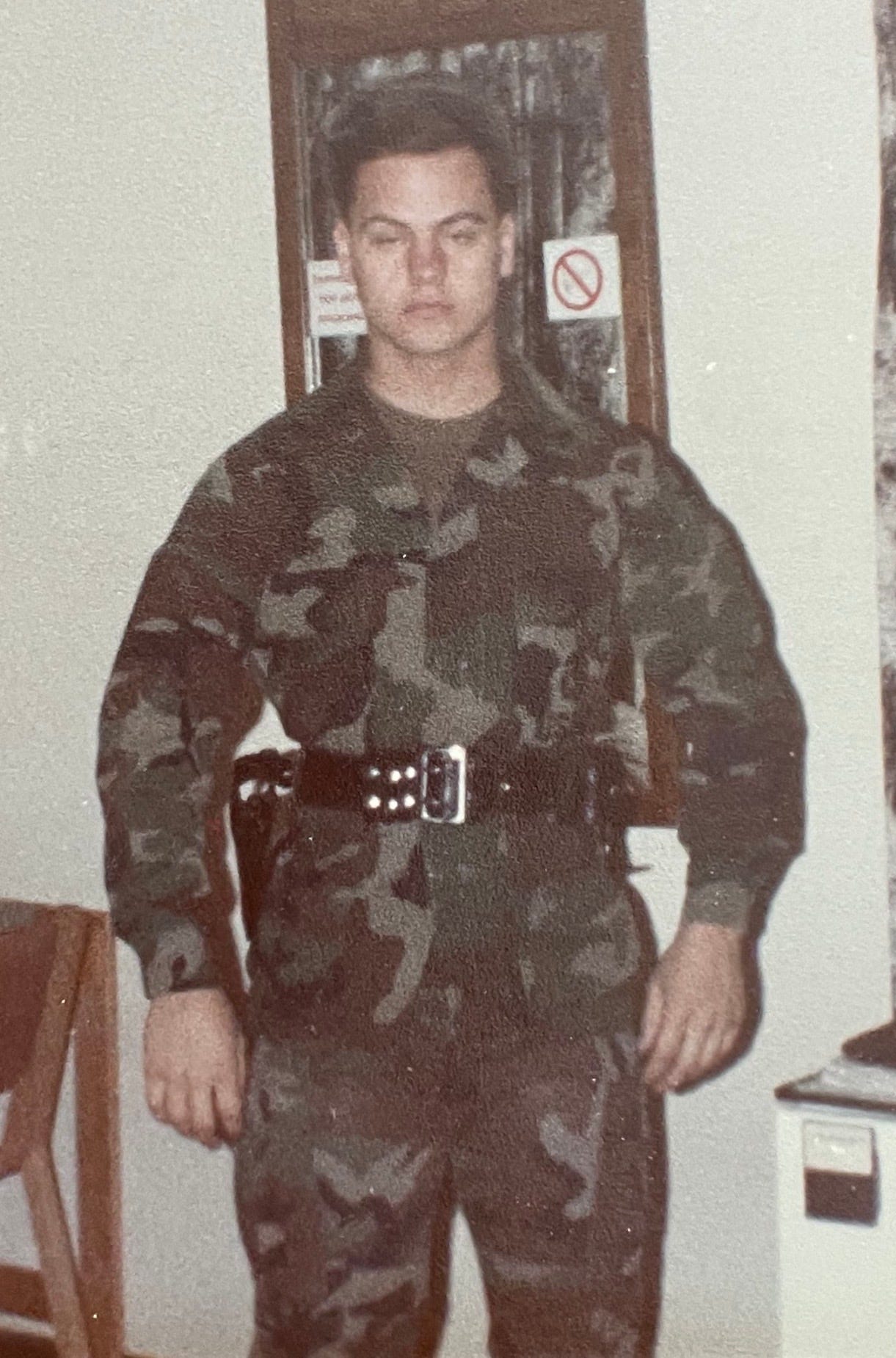A Waterloo Marine's 'last full measure' for his comrades
Former county Veteran Affairs director battles dementia, seeks recognition for Marine embassy guards

Kevin Dill’s duty assignments as a Marine took him halfway across the world and in harm’s way more than once.
However, you won’t see any service ribbons or medals for many of those on his chest. The same is true of many of his comrades in similar service.
They were Marine embassy guards. They served in many of the world’s “hot spots” where Americans were tolerated at best and targets at worst. Many saw action comparable to or worse than those in war zones. Some, in fact, were in war zones.
But because those Marines were under State Department command and not direct military command, their service is not recorded to the same detail as regular Marines, if at all. Dill says they should be eligible for the same service decorations and medals as any other military personnel in harm’s way.
”Many Marines that I served with were involved in duty that were under hostile fire, attacks at the embassy and even kidnapping attempts, but never received any awards, citations , decorations or anything listed in their service record books as it was kept within the confines of the State Department,” Dill said.
”During my time on embassy duty I was assigned to three hostile areas and involved in a number of operations and acts that any Marine out in the fleet would have been entitled to certain awards and decorations,” Dill said. “And so I'm requesting, on behalf of myself and other Marines within the Marine Security of Guard battalion back in 1985-1988, to verify and award those of us who are the forgotten Marines.”
Dill wants to make that happen sooner than later - while his is still able to do so.

Dill, who now lives in Waukee, has Lewy Body Dementia, a progressive illness for which there is no known cure. It forced his retirement as director of Black Hawk County Veteran Affairs about four years ago. According to the Mayo Clinic and medical journals, the projected life expectancy is about five to eight years after diagnosis, though some have lived as long as 20 years. In Dill’s case, it is considered a service-related disability.
Dill remains active; he is an avid golfer and engages in a number of activities to raise awareness of Lewy Body Dementia. For example, he recently made a presentation to pharmacy students at Drake University in Des Moines. He also sponsored a golf tournament in Waterloo in May.
However, given the potentially life-limiting prognosis associated with his disease, Dill is pursuing his mission to seek recognition for his fellow embassy guards as expeditiously as possible, writing his congressional representatives and anyone with resources or is willing to listen.
”Please help a dying former Marine with Lewy Body Dementia and others like me,” Dill said in a message to congressional representatives.
Dill lived in Evansdale and was 1983 graduating class president at Waterloo East High School. He also is a former Waterloo police officer, serving in the late 1990s, and was a member of the Waterloo Police Department’s drug crime enforcement unit. He previously was veteran affairs director for Scott County, which includes the Iowa side of the Quad Cities, before returning to Waterloo.
Dill was in the service from 1983-91 and served with the Marines in the 1980s in embassies in Cairo, Moscow and in Tegucigalpa, Honduras, adjacent to Nicaragua and El Salvador, each of which had internal civil conflicts. He also is a veteran of the 1991 Persian Gulf War. He also was attached at one point to the security detail for President George H.W. Bush.
He served in Cairo during rioting in 1986, helping rescue isolated American military personnel whose hotel was under fire during the chaos. Also, Dill himself narrowly avoided kidnapping after giving safe passage to an American civilian through the city. The kidnapping suspects were believed to be with the Palestine Liberation Organization.
On another occasion, while escorting American civilians to El Arish in the Sinai Peninsula near the Gaza Strip and Israel, Dill and comrades were confronted by armed Egyptian soldiers who thought the American Marines were Israeli commandos trying infiltrate or invade Egypt. The Marines’ Egyptian interpreter defused the situation.
Then, when Dill and his comrades returned to the American embassy in Cairo, they learned that the embassy’s Egyptian telephone operator had been detained for smuggling weapons into the compound in an ultimately thwarted PLO takeover plot. It would have been similar to the 1979 seizure of the American embassy in Iran.

In late 1986 in Honduras, Dill and others came under hostile fire while providing weapons training and tactics to Honduran soldiers. Dill later learned they may have accidentally crossed into Nicaragua or El Salvador and come under fire from either Nicaraguan Sandinista fighters or Salvadoran rebels. On another occasion, he and comrades were assigned to defend an ambassador’s residence, near where fighting was going on between Sandinistas and U.S.-backed contras across the border in Nicaragua.
Dill noted there is a move afoot to ask Congress to authorize an Armed Forces Expeditionary Medal to all U.S. troops who served in Honduras between 1981 and 1992. He said Marine embassy guards also should be eligible for that decoration.

In Moscow, prior to the fall of the Soviet Union, Dill was the non-commissioned officer in charge of the mess, meaning he was responsible for feeding the Marines on the compound and having adequate food supplies. “Our food came through Finland on trucks and many times the (Soviet) KGB would block our trucks coming from Finland and leave us struggling for food.
”There were many times that I — in an effort to keep the Marines fed — dressed up as a Soviet citizen, and a Marine who had a license to drive in Moscow would sneak me out of the compound in our van,” Dill said. “I would hide down on the floor so the KGB would only think one Marine was leaving, I would sneak out of the van and I would stand in the food lines with Russian citizens for bread and cheese and other things to keep our Marines fed.
”The Russian citizens knew who I was and would protect me from the KGB,” Dill said. “This was during a time when it wasn’t unlikely that the KGB would kidnap military service people and hold them for a period of time.”
Those are just examples of the kinds of service Dill said he and other Marine embassy guards experienced.
”Like many Marines who served on embassy duty, we did far above and beyond what was expected of us, but never received any recognition for it, unlike what fleet Marines would have received,” Dill said.
”My time on this earth is coming to an end,” Dill said. “My purpose in this is to leave some type of history of my time in the service for my children and my grandchildren. I'm also requesting assistance for all the Marines that I served with who are looking for the same thing as they are getting older.”
Pat Kinney is a freelance writer and former longtime news staffer with the Waterloo-Cedar Falls Courier and, prior to that, several years at the Ames Tribune. He is currently an oral historian with the Grout Museum District in Waterloo. His “View from the Cedar Valley” column is part of “Iowa Writers Collaborative,” a collection of news and opinion writers from around the state who previously and currently work with a host of Iowa newspapers, news organizations and other publications. They are listed below. Clink on the links to check them out, subscribe for free - and, if you believe in the value of quality journalism, support this column and/or any of theirs with a paid subscription .
The Iowa Writers’ Collaborative




Deserve medals. Embassy duty is hazardous.
Thanks for sharing this story. I was not aware Embassy marines have not been recognized in this manner for their service.